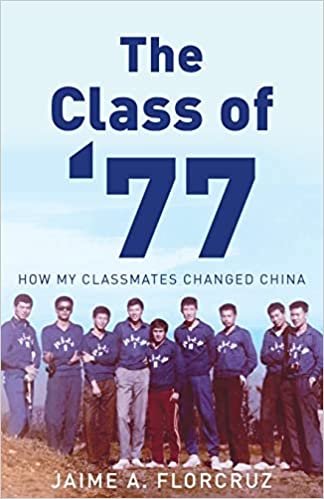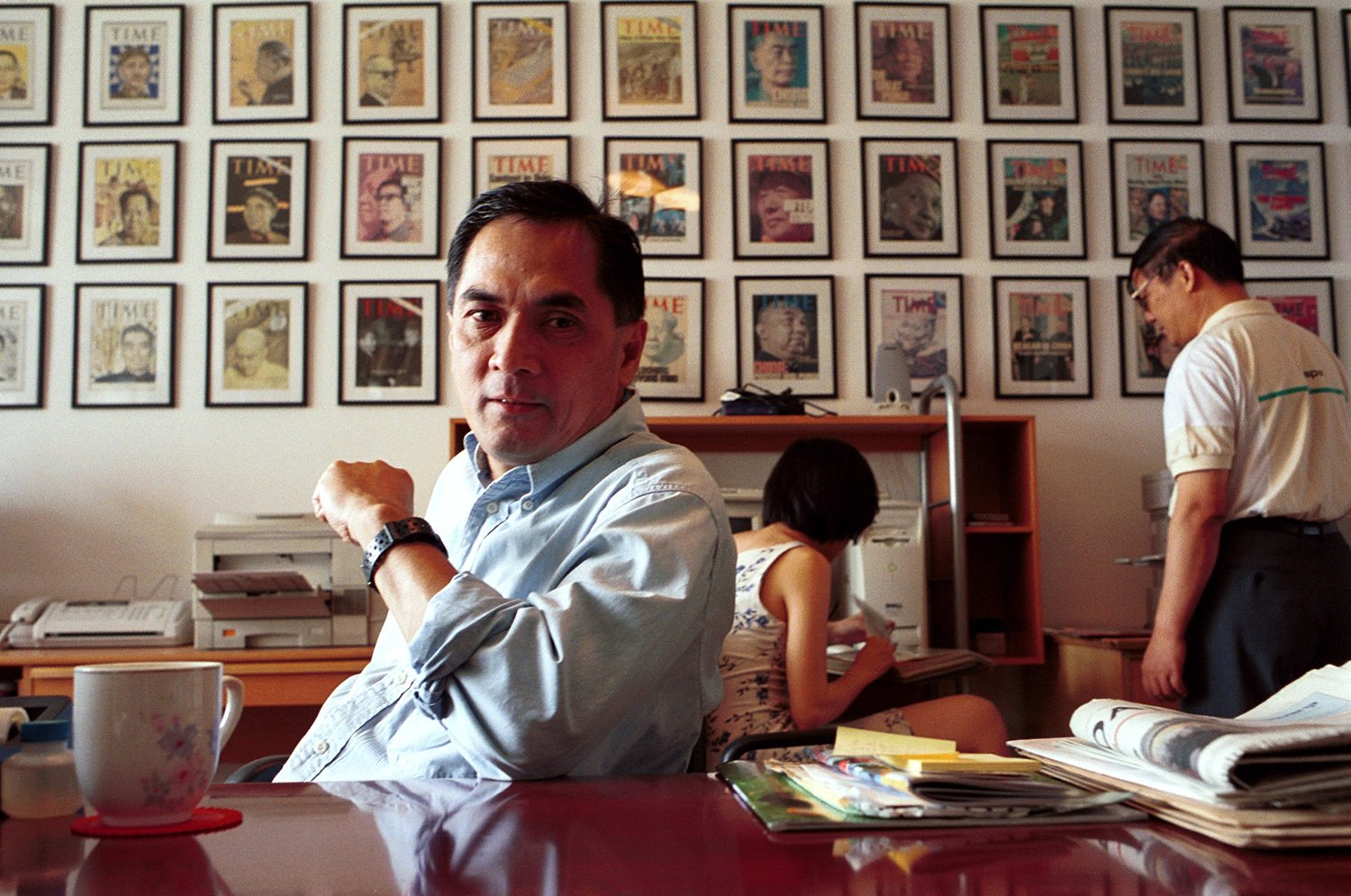"Lucky Rice" at Beida
/Book Review:
The Class of '77: How My Classmates Changed China, by Jaime FlorCruz (Earnshaw Books Ltd., 2022.
But this is really not his autobiography. Instead, FlorCruz mainly tells the larger narrative of Beida's Class of 1977. His classmates belonged to families who were "forced to grow up in the countryside...as Mao and the Red Guards sought to cleanse their parents of their bourgeois detritus." But they would use whatever limited resources they had to prepare for and pass the college entrance examinations three years after the government reopened the schools. The smartest among them entered China's most prestigious university.
FlorCruz, whose Chinese name is "Ji Mi" (Lucky Rice), proudly recalls his class of ‘77:
"Year 1977 was a cathartic year of change. Once a stagnant country, China in that year began to percolate with pent-up energy and unfulfilled ambitions…That generation of exam takers, hungry for knowledge and seeking a better life, would soon ignite decades of growth, turmoil and reform. Most entrants were young people whose schooling had been disrupted by the Cultural Revolution. Many had endured hardships in factories or in the countryside. Some were languishing in boring clerical jobs in the bureaucracy. That year, 5.7 million people sat through days of competitive exams. Only 4.8 per cent of them passed. That was the first generation of college students in twelve years who were admitted based on academic merit. It was the first time that they were given the chance—for some, the last chance—to change their destiny. Most were already in their twenties, or even thirties. Some already had children. Years later, thanks to their grit, intellect and resilience, many of this generation joined the elite in politics, education, military, business, art and culture. They took up the responsibility to help China avoid dystopia and instead enter a period of rejuvenation. They became known as the class of '77."
FlorCruz became the only Filipino student to enter Beida. He had an edge over his classmates. He was already a college student when he joined a "Philippine Youth Delegation" that the Chinese government invited to observe "the egalitarian ways of the Communist." After a few weeks, he was not sure that Mao Tse Tung Thought was the right path to follow for Filipino revolutionaries. But he kept his disillusionment private when he found himself stuck in China after Ferdinand Marcos suspended the writ of habeas corpus in 1971 and he was on the list of activists to be arrested. FlorCruz would "turn a bad thing into a good thing," moving out of Beijing to work on a state farm in Hunan Province (The Great Helmsman's home province) and then in a fishing company in Shandong Province. He taught himself enough Mandarin to qualify for third-level Chinese at the Beijing Language Institute.
FlorCruz working at TIME magazine in the 1990s (Photo courtesy of Jaime FlorCruz)
He could even pass himself off as Chinese! "I could squat like a farmhand, ungainly and low to the ground, legs spiking from the hips like a grasshopper—just like my co-workers in the Hunan countryside where I toiled for more than a year. I carried my clothes and belongings in an olive-green satchel like the foot soldiers of the People's Liberation Army. I smoked a pack-a-day of Zhengzhou, a cheap brand of cigarette also from Hunan, the birthplace of China's paramount chain smoker and then-living god, Chairman Mao Zedong. In between puffs, I would hold the lit stick like a peasant—not elegantly between the index and middle fingers, but between my thumb and forefinger. I spoke fluent enough Putonghua—that's Mandarin to foreigners—and could read more than 800 characters, which put me on par with some rural Chinese, many of whom were still haphazardly educated."
(As wide-eyed young Maoists at the University of the Philippines, we tried to imitate the Great Helmsman's way of smoking until one comrade scolded us for being baduy [bumpkins]).
Being part of the class of '77 explains the reticence on FlorCruz’s part, all throughout the memoir, to just write about himself. How could one separate oneself from China's equivalent of "The Greatest Generation" (the term describing Americans who fought in World War II)? How can one not be proud of having been in the same classes as Bo Xilai, who turned Dalian City and Liaoning Province into growth centers, was appointed Minister of Commerce, and then a Member of the Politburo of the Chinese Communist Party? (Bo's career plummeted after he was found guilty of conspiring with his wife to kill a British businessman. He was stripped of all his official positions, found guilty of corruption in 2013, and now languishes in Qincheng Prison).
The political fortunes of Li Keqiang, another Class of '77 alumnus, were much better. The economics graduate rose from being the youngest provincial governor (1998) to Premier of the State Council. Li is known as a technocrat and pragmatist who used to favor greater economic liberalization. However, he has since advocated for shifting to a consumption-based economy and away from export-driven economic growth. Another class member, the philosophy major Zhao Leji, is another political success. Zhao is now a member of the Party Politburo's seven-man Standing Committee, which oversees the entire Party organization and is a major policy-making group.
The class also has had its share of dissidents. The most prominent is Wang Juntao, "enfant terrible of the Physics Department," who established the first independent think tank (the Beijing Social and Economic Sciences Research Institute). Wang was more known as one of the leaders of the Tienanmen student protests. He was arrested and sentenced to 13 years in prison until the American government negotiated for his release and exile to the United States. FlorCruz saw him in New York.
“FlorCruz, whose Chinese name is “Ji Mi” (Lucky Rice), proudly recalls his class of ’77. ”
FlorCruz is no ordinary graduate himself. After finishing, he taught English to Beida academics and students at the Peking Normal College. He also became quite a star, thanks to his weekly program "Let's Sing" on national television. His star would rise further when he joined Time Magazine in 1982, becoming its Beijing Bureau Chief from 1990 to 2000. CNN pirated him in 2000, and he would finish his career with the network. FlorCruz still lives in China and is an adjunct professor at his alma mater.
Now retired, he reminds himself of how little has changed with how the Communist Party exercises power from the time he arrived in China. In fact, things seem to regress further as Xi Jinping continues to push for a return to Maoism. But there is very little cause for worry. The new middle class and the Chinese elites agree with Xi's technocratic "China Dream" (Zhongguo Meng) where, by attaining the goal of "collective prosperity and realization of socialism," the people will be able to recapture "China's standing in the global stage [and a] a triumphant comeback of the Middle Kingdom."
In short, the Chinese seem content with their leaders. Except that the march to collective prosperity is hindered by at least two problems the memoir appears to miss. The first is that Zhongguo Meng's beneficiaries may not be totally loyal to the cause. In its July 7 issue, Fortune Magazine reported that about 10,000 "high-net-worth individuals (HNW) in China are seeking to leave their country and could take $48 billion in wealth with them" (https://www.yahoo.com/video/june-shanghai-billionaire-set-social-110000784.html). This is over and above the $17.5 billion that Chinese millionaires and billionaires have already squirreled abroad in March. Moreover, the outflow of Chinese money is expected to worsen as the wealthy worry about how the war in Ukraine will affect the Chinese economy.
And while the rich are fleeing, China has become "a highly unequal society," according to the Washington-based Center for Strategic and International Studies. Socialist China is producing the same detritus as its capitalist rivals. And when the time comes that the Chinese poor start openly complaining, it is very likely that they will be pointing their fingers at some of the members of the class of '77 for their sad fate.
I suspect that if FlorCruz has time to revise The Class of '77, the book's second edition will include his reflections on these issues. These are matters that most likely will reanimate the journalist in him.
Patricio N. Abinales' new book is Modern Philippines, an encyclopedia for high school students and college freshmen.
More articles from Patricio Abinales





